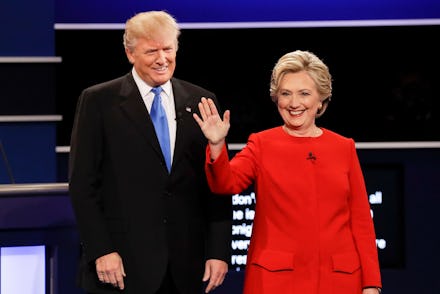How much do debates matter, anyway? Here's what the numbers show.

It's been nearly two weeks since Donald Trump and Hillary Clinton squared off in their first debate at Hofstra University on Long Island, and the data is clear: It changed the dynamics of the race.
Since the 90-minute showdown ended, polls have swung dramatically in Clinton's favor, improving voters' views of her temperament and preparedness to lead, while Trump's image in those areas took a nosedive.
And because the debates clearly impacted voters' feelings about the candidates, political analysts say that puts just as much pressure on the second presidential debate scheduled to take place Sunday night in St. Louis.
"The first debate certainly mattered," Stu Rothenberg, a non-partisan political analyst and columnist for the Washington Post, said in an interview. "It improved the public's view of Hillary Clinton, and it raised further questions about Donald Trump's temperament and style."
Before Clinton and Trump took the stage, polling averages and election forecasts showed the race was a jump ball — leaving Trump supporters bullish about his chances and Clinton supporters worried about what could transpire on Nov. 8.
Yet after the Republican nominee's abysmal debate performance, in which he sniffed and interrupted his way through the event, falling into every trap set for him by Clinton's campaign, Trump's numbers took a tumble.
Polls now show Clinton with a commanding lead, putting her chances at their highest level since the Democratic National Convention wrapped up at the end of July.
Because polls show the debate did have a sweeping impact on the race, analysts say Trump needs to come to the next one with a more measured and presidential tone if he hopes to swing momentum his way.
Given that just 48 hours before Trump was set to take the stage, damning video surfaced of Trump bragging about sexually assaulting women. Not only could the leak knock Trump off his game, but it could also make any attempt to look presidential look contrived given the behavior Americans saw Trump exhibit.
Even worse, political experts say Sunday night's town hall-style debate could be problematic for Trump — who has a tendency to lash out at anyone who questions him, including the Khan family and former Miss Universe Alicia Machado.
Unlike past debates Trump has participated in where moderators have asked the questions, they will come from undecided voters on Sunday. And Trump will have to figure out how to show empathy in his responses, even if voters are asking tough questions.
"The challenge for Donald Trump is, if one of the audience members asks him a question and he takes them on the way he did with Alicia Machado or the Khans, I think that could be the deal breaker for the race," Mary Anne Marsh, a Massachusetts-based Democratic consultant, said in an interview. "And I have not said that about any other event in this race."
In order to prepare for the format, Trump's campaign set up a town hall Thursday night in New Hampshire, one of just a handful of town halls Trump has held throughout the campaign.
Yet the town hall was a highly controlled event, with an invite-only crowd asking softball questions that weren't anything like the questions he'll be asked on the debate stage.
Trump was asked about his earliest childhood memories and what he would "say to Hispanics deceived by Obama, Clinton and the biased media," according to Boston Globe reporter Matt Viser.
And even with carefully screened guests and easy questions, Trump managed to be controversial.
He attacked a fellow Republican in Sen. Mark Kirk, who has said he is not voting for Trump in November.
Trump also continued to complain about the microphone at the first debate, which he blamed for his widely panned performance.
Still, Clinton's campaign says she is preparing for a measured Trump to take the stage.
"We expect a more focused, more prepared Trump at this debate," Clinton Campaign Manager Robby Mook told reporters a conference call Thursday, according to RealClearPolitics.